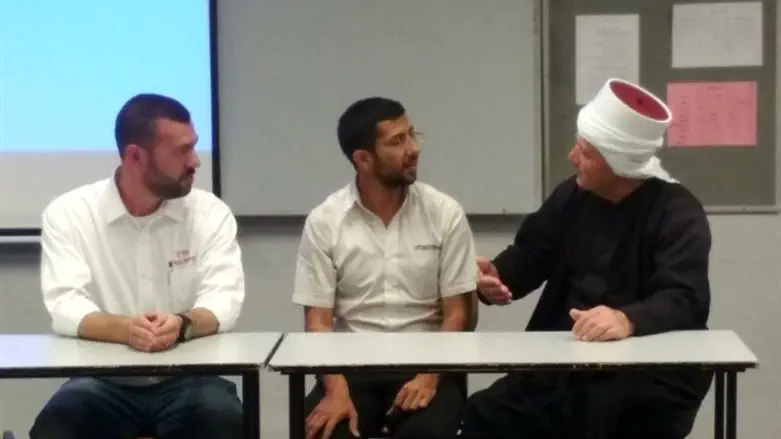In the same week that Israel saw a serious increase in the threat looming across the Golan Heights from Syria, members of the Druze villages in the northern Golan Heights got together to help make a difference in their own communities. Volunteers from the Druze towns in the northern Golan including, Majdal Shams, Ein Kenya, Masada, and Buq’ata began an EMT training course that will train and qualify local volunteers to provide an emergency medical response to injured and sick people in their communities while they wait for ambulances to arrive.The courses are taking place in Buq'ata and are being run by United Hatzalah of Israel.
Tlal Gotani, the Director of the Shaba ambulance company that provides ambulance service to the northern Druze communities organized the course together with Nachi Klein the Chapter Head of United Hatzalah in the Galilee and Golan. “We sorely need extra teams of EMS volunteers inside the communities for a variety of reasons,” said Gotani. “We are one of the most highly trafficked areas in terms of tourism and one of the most beautiful places in the country. Hundreds of thousands of tourists come to the northern Golan every year and often need medical assistance. Training more volunteers here means providing a faster emergency response for them, and I am happy that United Hatzalah is taking a leadership role in helping our communities.”
Gotani added that there is an extra added element of concern during times of conflict. “Obviously during times of peace, we have the local residents who need help as well as the tourist. But during times of conflict, the situation becomes tenser. We need to have responders in each and every town, not just where the ambulances are situated. Many times there are emergencies and it can be difficult for the ambulance or other vehicles to travel, for example during the time of an airstrike or even during peaceful times under heavy snow or fog. All of these instances make driving conditions treacherous at best. We also are more than a 30-minute drive from the closest intensive care ambulance, and more than an hour away from the nearest hospital at the best of times. So first responders here really do make the difference between life and death,” Gotani said. “My dream for the near future is to open up a paramedics course with United Hatzalah so that we can train a group of paramedics who can provide advanced life support in the area as it is much needed.”
When asked if the escalating conflict encouraged people to sign up for the training Gotani responded by saying: “The people in the Druze communities have wanted to do this for a long time. We finally approached United Hatzalah and they agree to do the course and train a new group of volunteers. We had so many applicants that I could have easily opened two or three courses simultaneously. That is how much people here want to help. The desire has been around since before the most recent round of conflict. Obviously, that helps add fuel to the fire but it wasn’t what is causing people to want to train. They simply want to help others.”
Gotani himself has been in the field of emergency first response for more than 20 years and his ambulance service Shaba, which is a Hebrew acronym for Private Ambulance Service in the Golan has been running for more than a decade. He is an advanced EMT and an EMS instructor and was the person who provided the main push for this new course to open.
“The new recruits have seen the activity of United Hatzalah and saw the work that the organization was doing and wanted to bring that model to the Druze communities in the northern Golan. They, like myself, want to see the area have as much coverage as they have in other locations throughout Israel. We want to close the gap in coverage for our communities and helping increase the network of lifesaving volunteers of United Hatzalah who provides coverage from the top of the Hermon to Eilat. Once the new trainees graduate, we will have that many more people who can provide assistance from the top of the Hermon all the way down to the bottom of the Golan,” Gotani added.
